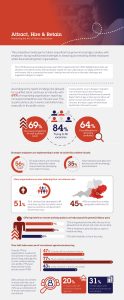Attract, Hire & Retain – Mastering the Art of Talent Acquisition




The findings in the latest CIPD Resourcing and talent planning report 2024, supported by Omni, have revealed that employers are still struggling to find the right talent for their organisations – and with more than a quarter (27%) of selected candidates always, mostly, or sometimes failed to turn up on the first day, effectively “ghosting” the employer, clearly hiring strategies are lacking the “stickiness” needed to get strong talent through the door. In this article we will explore ways to master the art of talent acquisition.
Gone are the days of recruiters searching through data lists in their Applicant Tracking System (ATS), or even sending mass InMail’s on LinkedIn to source candidates. Now with tech on their side and a myriad of ways to reach talent, a recruiter’s job may seem easier… but is it?
There is no denying that the landscape of talent acquisition is shaped by shifting market dynamics, changing workforce expectations, shifts in candidates’ wants and intensified competition for qualified talent. The report unpacks these challenges, revealing that organisations are grappling with talent scarcity and increased difficulty in attracting candidates for various roles.
As a leading recruitment partner, Omni has unique insights into talent acquisition trends and our close relationships with clients and deep industry connections affords us the opportunity of knowing what strategies are effective.


The competition for talent remains fierce across industries and once again we find candidates driving the market. According to the report, competition for well-qualified talent has increased over the last year, according to 69% of respondents.
This uptick in competition has translated into significant challenges, with 84% of organisations attempting to fill vacancies and 64% experiencing difficulties in attracting candidates. These challenges are particularly prevalent when recruiting for senior and skilled roles, especially within the public sector (52%). However, even lower skilled roles are not immune, with 19% of organisations facing difficulties in attracting candidates for these positions.

The competition for talent remains fierce across industries and once again we find candidates driving the market.
Changes in migration rules have played a suspected role in exacerbating talent scarcity. Restrictions on immigration have limited the pool of available talent, particularly in industries reliant on international workers. The impact of these rules is felt acutely in sectors such as healthcare, hospitality, and technology, where skills shortages are most pronounced.
The demand for well-qualified talent has surged, driven by technological innovation and the need for specialised skills. Organisations must refine their talent acquisition strategies to compete effectively. This includes investing in targeted employer branding, enhancing the candidate experience, and offering competitive compensation packages that go beyond salary to include benefits that resonate with the modern workforce.

The shift towards hybrid and flexible working has emerged as a critical factor in attracting and retaining talent. Flexible working arrangements are increasingly viewed as a non-negotiable aspect of employment, with candidates prioritising work-life balance and autonomy in their job search.
Giving Candidates What They’re After
Improving Recruitment Outcomes

The shift towards hybrid and flexible working has emerged as a critical factor in attracting and retaining talent.
To address the ongoing competition for talent, organisations must adopt a multi-channel sourcing strategy. This approach leverages a variety of recruitment channels to reach both active and passive candidates, as well as those who may not be actively seeking new opportunities but could be enticed by the right offer.
Targeting Engaged, Unengaged, and Offline Candidates
A multi-channel approach allows organisations to reach candidates through diverse mediums, including social media marketing, networking /industry events, traditional job boards, and employee referrals. By diversifying sourcing methods, employers can engage with candidates at different stages of the job search process, from those actively seeking new roles to those who may not be considering a change but are open to opportunities. Partnering with a resourcing expert like Omni, will give your organisation to access to a myriad of ways to attract talent without having to invest the expensive tech to do so.
Enhanced Reach and Visibility
Utilising multiple channels increases the visibility of job openings and the employer brand. For example, really activating your brand with posts and stories on social media platforms like LinkedIn and Instagram can be powerful ways for showcasing company culture and attracting talent that aligns with the organisation’s values and mission. Networking events and industry conferences provide opportunities to connect with niche talent pools, while traditional job boards and specialist recruitment partners like Omni, can support efforts to fill specific roles.

A strong employer brand is a cornerstone of effective talent attraction and retention. The employer brand encompasses the organisation’s reputation as an employer, its culture, values, and the overall employee experience it offers. In a competitive talent market, a compelling employer brand can be a significant differentiator.

To mitigate the challenges highlighted in the CIPD Resourcing and Talent Planning Report 2024 and elevate resourcing strategy, Omni recommends the following:
Adopt Flexible Working Practices:
Enhance Employer Branding Efforts:
Leverage a Multi-Channel Sourcing Strategy:
By implementing these strategies, organisations can not only navigate the current challenges in talent acquisition but also position themselves as employers of choice in a competitive market. Omni is committed to supporting its clients in refining their resourcing strategies to attract, engage, and retain the talent needed for sustainable growth and success. Get in touch with us today to find out more.

Omni’s EDI Training for Leadership Teams covers the value of leading teams inclusively, how leaders impact an organisation’s EDI agenda, barriers hindering an inclusive culture, addressing unacceptable behaviours, the complexities of microaggressions, the implications of being a bystander, and understanding laws protecting employees from discrimination.
Omni’s training covers understanding potential discrimination areas during recruitment, recognising bias and its impact, avoiding discrimination, implementing positive action and diversity strategies, making reasonable adjustments, objective shortlisting and selection through evidence-based decisions, and structured interview techniques with appropriate questions.
Omni offers tailored training programs in various formats, including face-to-face, live virtual workshops, and eLearning modules, to meet your business objectives. With a satisfaction score of over 95% and clients returning year after year, Omni has a proven track record of delivering high-quality training that meets organisational needs.
At Omni, we prioritise an evidence-based approach that ensures reliable and effective assessment processes. Our team of expert Organisational Psychologists brings extensive experience in designing and delivering robust assessments that are inclusive, skills-focused, and tailored to your unique organisational needs. We also offer flexibility and support throughout the assessment process, ensuring successful implementation and tangible results.
Our assessment solutions are designed to elevate your hiring process by identifying the best candidates based on their skills, potential, and fit for the role. We help you define the critical competencies required for success, develop tailored assessments that accurately evaluate these competencies, and provide deep insights into candidates’ aptitude and personality traits. This evidence-based approach improves productivity, reduces turnover, and ensures a positive candidate experience. There are several benefits that personality profiling can bring to the recruitment process, such as supporting inclusive hiring, improved decision making, and increased efficiency.






